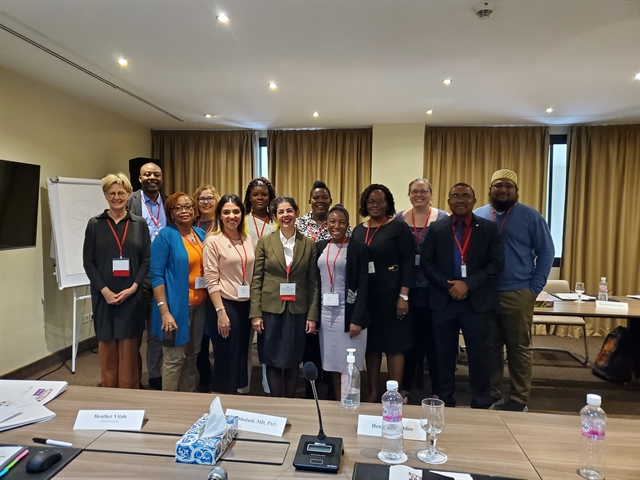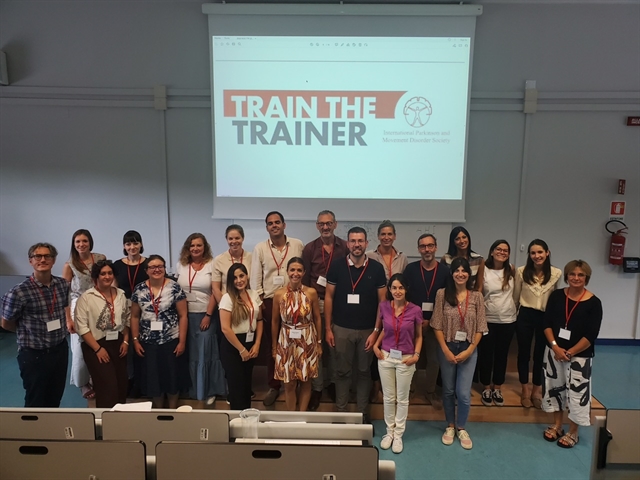 VOLUME 27, ISSUE 4 • December, 2023. Full issue »
VOLUME 27, ISSUE 4 • December, 2023. Full issue »

Parkinson’s disease (PD) and other movement disorders (MD) are complex conditions affecting motor and non-motor functions. Comprehensive therapy can improve patients' and caregivers' quality of life1. However, there is a lack of multidisciplinary specialists and allied health professionals required for optimal management, especially in rural areas and low- and middle-income countries2.
To address this global gap in management, the International Parkinson and Movement Disorder Society (MDS) launched the Train The Trainer Program (MDS TTP) to increase the number of professionals with expertise in PD and MD. It selects and trains professionals to adapt their knowledge to local settings and deliver local training in their native language.
The 2022-2023 pilot program involved all four MDS regional sections: Africa (MDS-AS), Asia, Oceania (MDS-AOS), Europe (MDS-ES), and Pan-America (MDS-PAS).


MDS-AS Program
The MDS-AS provided a comprehensive teaching and learning program that combined virtual lectures and panel discussions, followed by a 2-day in-person workshop. The virtual program covered the diagnosis and phenomenology of MD syndromes, as well as various treatment options. The workshop focused on assessment tools, rehabilitation, and palliative care.
A total of eight trainers, including one speech therapist, five physiotherapists, and two neurologists, successfully completed the training. Furthermore, all trainers completed their local trainings and established networks and partnerships to deliver their own training programs, attended by 859 professionals.
Asia, Oceania Section Program
The MDS-AOS program successfully educated five trainers from various countries, including Australia, Hong Kong, Jordan, and Nepal. The trainers participated in online training sessions twice a month for eight months and later attended a 2-day workshop in Abu Dhabi to learn how to design and deliver their own program.
After returning to their respective countries, they were able to successfully conduct 1-2 day workshops either online or face-to-face, which were attended by more than 120 people. The workshops focused on topics like the management of motor and non-motor symptoms of PD, as well as the pathophysiology and interprofessional comprehensive care of Parkinsonism and related disorders.
European Section Program
In the MDS-ES, the primary objectives of the courses were to develop experience in the differential diagnosis of cognitive disorders in MD. The courses provided theoretical and practical knowledge, including how to perform and score cognitive tests and address issues associated with cognitive assessment, including biases due to the co-presence of motor/non-motor symptoms. The program's relevant topics were selected based on an online survey provided by trainers before the course. The courses also included video and in-person case discussions.
The 3-day in-person training covered neuropsychology and MD, including hands-on workshops, which focused on a range of topics from biomarkers and clinical profiles to alternative non-pharmacological treatments such as cognitive behavioral therapy and palliative care. The second step was a six-month virtual engagement with webinars and discussions. Overall, the course was successful, and all the psychologists appreciated learning about best practices in neuropsychology and ongoing research.
PAS section program
The MDS-PAS prioritized interprofessional care. Considering the large socio-economic and cultural diversity in countries across North, Central, and South America, four physiotherapists, three speech therapists, and three psychologists were selected from six different countries. The training program included online modules on the pathophysiology and management of PD. Participants used that knowledge to develop optimal interprofessional care for patients at different PD stages during three online case discussions.
In-person training was conducted in Sao Paulo over a two-and-a-half-day training program. The trainees had the opportunity to evaluate, discuss, and treat patients with early, moderate, and advanced PD, focusing on people-centered and integrated care principles.
After the preparation phase, trainers were tasked with identifying the most suitable format for their local reality, with guidance from the faculty team. As a result, the trainees delivered 11 local training programs in three languages. In total, 570 health professionals were reached, and 100% evaluated the local program as very effective in improving their ability to deliver more effective care for people with PD.
There were also two remarkable additional gains of the program: building collaborative networking among the trainers and empowering the trainers to propose further education programs in collaboration with MDS.
-
Movement Disorders. International Parkinson and Movement Disorders Society available at https://www.movedisorder.org/. November 24, 2023.
-
WHO Atlas: country resources for neurological disorders – 2nd ed. Geneva: World Health Organization; 2017. License: CC BY-NC-SA 3.0 IGO
Read more Moving Along:






